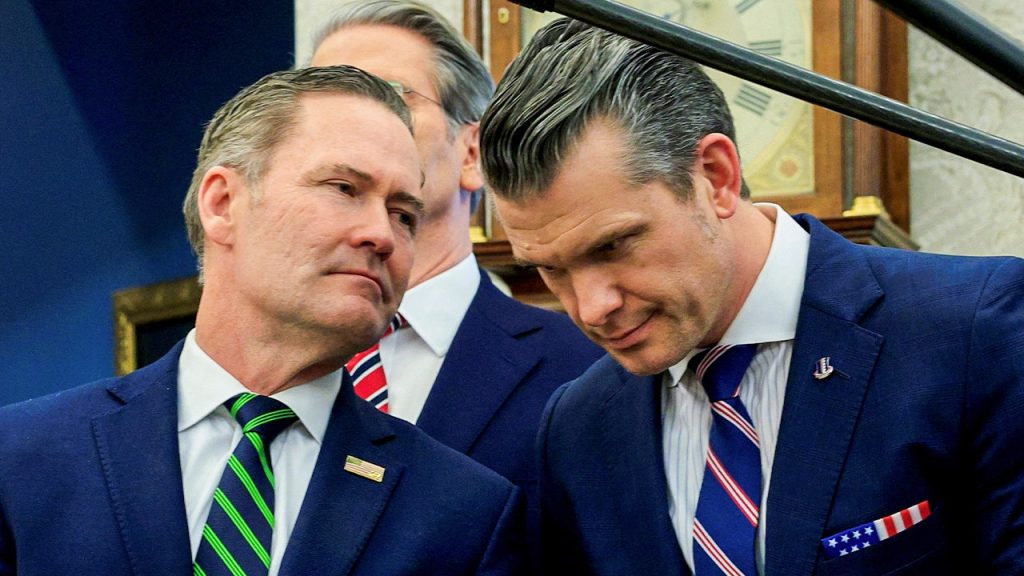Recent reports have surfaced revealing the private contact information of several high-ranking officials from the Trump administration, including National Security Advisor Mike Waltz, Director of National Intelligence Tulsi Gabbard, and Secretary of Defense Pete Hegseth. This information became publicly accessible due to a leak related to a Signal chat that discussed U.S. military operations against Yemen’s Houthi rebels. The findings, reported by Germany’s Der Spiegel, raise significant concerns about security protocols surrounding sensitive communications within the government.
| Article Subheadings |
|---|
| 1) Leak of Sensitive Information Raises Security Concerns |
| 2) Extensive Details Shared in Signal Chat |
| 3) Officials Respond to Breach of Privacy |
| 4) Implications for National Security |
| 5) Future Precautions and Protocols Under Review |
Leak of Sensitive Information Raises Security Concerns
Reports have emerged indicating that private contact information of top officials from the Trump administration has been leaked online. This incident centers around a Signal text chain that exposed U.S. military plans targeting Yemen’s Houthi rebels. Key figures such as National Security Advisor Mike Waltz, Director of National Intelligence Tulsi Gabbard, and Secretary of Defense Pete Hegseth have been identified as those whose details were compromised. Notably, this breach raises questions concerning the integrity of communications within high levels of government and whether adequate measures are in place to protect sensitive information.
Extensive Details Shared in Signal Chat
The leaked information contains a variety of sensitive data, including phone numbers, email addresses, and potentially some passwords belonging to the officials mentioned. According to Der Spiegel, this data was uncovered through commercial search engines and hacked information that had been circulating online. Many of the leaked email addresses and phone numbers appear to still be in active use, and they were reportedly linked to social media profiles, Dropbox accounts, and fitness-tracking applications such as Strava. This disclosure not only concerns private communications but also suggests vulnerabilities in the way government officials manage their digital identities.
Officials Respond to Breach of Privacy
In light of the leaks, officials have started to respond to the fallout. Pete Hegseth firmly denied any wrongdoing, stating that he did not share classified information during the Signal chat which took place on March 26, 2025. Additionally, as per reports, accounts allegedly belonging to Mike Waltz have since been deactivated following queries made by Der Spiegel. The Office of the Director of National Intelligence asserted that the compromised information was nearly a decade old and that passwords had undergone numerous updates since then, reducing the likelihood of current relevance. However, the sentiment among national security experts indicates an urgent need to revisit protocols governing how sensitive information is communicated and secured.
Implications for National Security
The implications of this leak extend beyond mere personal privacy violations. Security analysts are raising alarms that the exposed details could compromise U.S. intelligence operations both domestically and abroad. If adversaries gain access to such sensitive information, it may hinder operational capabilities and endanger national security alliances. The very fabric of trust that exists between key government officials could also be adversely affected, further complicating future discussions regarding national defense strategies. The breach highlights flaws in protecting classified information, emphasizing an increased vulnerability among government communications.
Future Precautions and Protocols Under Review
As discussions continue regarding the fallout from the Signal chat leak, government agencies are likely to revisit and revise their internal policies regarding digital communications. Enhanced training on security protocols for officials, as well as the implementation of more stringent verification for apps used in classified discussions, are potential steps that may be taken. Investigations will seek to understand how such breaches happen and how to mitigate future risks. The growing reliance on digital communications necessitates a cultural shift in how governmental agencies address potential cybersecurity threats.
| No. | Key Points |
|---|---|
| 1 | Private information of Trump administration officials was leaked online. |
| 2 | The leak includes phone numbers, email addresses, and some passwords. |
| 3 | Officials have responded, insisting that the information is outdated. |
| 4 | National security implications could arise from the breach, affecting U.S. operations. |
| 5 | The government may implement new protocols to enhance the security of communications. |
Summary
The recent leak of private information concerning high-ranking officials from the Trump administration poses serious security concerns for U.S. national interests. While responses from the officials emphasize the outdated nature of the compromised data, the implications of such a breach warrant urgent reviews of communication protocols within government frameworks. There is a clear need for enhanced protective measures to safeguard sensitive information from potential adversaries and to maintain the integrity of U.S. national security operations.
Frequently Asked Questions
Question: What was disclosed in the Signal text chain leak?
The leak included sensitive information such as phone numbers, email addresses, and some passwords of high-ranking Trump administration officials discussing military plans against the Houthi rebels in Yemen.
Question: How are officials responding to the breach?
Officials have emphasized that the leaked information is outdated and that measures such as password updates have been implemented over the years. Pete Hegseth denied sharing classified information during the Signal chat.
Question: What are the potential implications of this leak?
The breach has raised alarms about national security and the potential for foreign adversaries to exploit the exposed information, posing risks to U.S. intelligence operations and strategic alliances.
